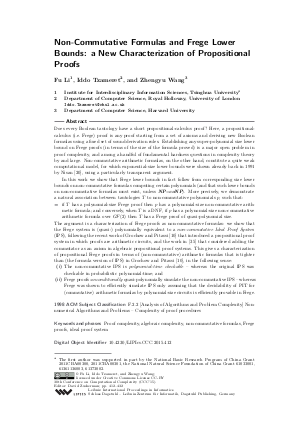Non-Commutative Formulas and Frege Lower Bounds: a New Characterization of Propositional Proofs
Authors Fu Li, Iddo Tzameret, Zhengyu Wang
-
Part of:
Volume:
30th Conference on Computational Complexity (CCC 2015)
Part of: Series: Leibniz International Proceedings in Informatics (LIPIcs)
Part of: Conference: Computational Complexity Conference (CCC) - License:
 Creative Commons Attribution 3.0 Unported license
Creative Commons Attribution 3.0 Unported license
- Publication Date: 2015-06-06
File

PDF
LIPIcs.CCC.2015.412.pdf
- Filesize: 0.51 MB
- 21 pages
Document Identifiers
Subject Classification
Keywords
- Proof complexity
- algebraic complexity
- arithmetic circuits
- Frege
- non-commutative formulas
Metrics
- Access Statistics
-
Total Accesses (updated on a weekly basis)
0PDF Downloads0Metadata Views
Abstract
Does every Boolean tautology have a short propositional-calculus proof? Here, a propositional-calculus (i.e. Frege) proof is any proof starting from a set of axioms and deriving new Boolean formulas using a fixed set of sound derivation rules. Establishing any super-polynomial size lower bound on Frege proofs (in terms of the size of the formula proved) is a major open problem in proof complexity, and among a handful of fundamental hardness questions in complexity theory by and large. Non-commutative arithmetic formulas, on the other hand, constitute a quite weak computational model, for which exponential-size lower bounds were shown already back in 1991 by Nisan [STOC 1991], using a particularly transparent argument. In this work we show that Frege lower bounds in fact follow from corresponding size lower bounds on non-commutative formulas computing certain polynomials (and that such lower bounds on non-commutative formulas must exist, unless NP=coNP). More precisely, we demonstrate a natural association between tautologies T to non-commutative polynomials p, such that: (*) if T has a polynomial-size Frege proof then p has a polynomial-size non-commutative arithmetic formula; and conversely, when T is a DNF, if p has a polynomial-size non-commutative arithmetic formula over GF(2) then T has a Frege proof of quasi-polynomial size. The argument is a characterization of Frege proofs as non-commutative formulas: we show that the Frege system is (quasi-)polynomially equivalent to a non-commutative Ideal Proof System (IPS), following the recent work of Grochow and Pitassi [FOCS 2014] that introduced a propositional proof system in which proofs are arithmetic circuits, and the work in [Tzameret 2011] that considered adding the commutator as an axiom in algebraic propositional proof systems. This gives a characterization of propositional Frege proofs in terms of (non-commutative) arithmetic formulas that is tighter than (the formula version of IPS) in Grochow and Pitassi [FOCS 2014], in the following sense: (i) The non-commutative IPS is polynomial-time checkable - whereas the original IPS was checkable in probabilistic polynomial-time; and (ii) Frege proofs unconditionally quasi-polynomially simulate the non-commutative IPS - whereas Frege was shown to efficiently simulate IPS only assuming that the decidability of PIT for (commutative) arithmetic formulas by polynomial-size circuits is efficiently provable in Frege.
Cite As Get BibTex
Fu Li, Iddo Tzameret, and Zhengyu Wang. Non-Commutative Formulas and Frege Lower Bounds: a New Characterization of Propositional Proofs. In 30th Conference on Computational Complexity (CCC 2015). Leibniz International Proceedings in Informatics (LIPIcs), Volume 33, pp. 412-432, Schloss Dagstuhl – Leibniz-Zentrum für Informatik (2015)
https://doi.org/10.4230/LIPIcs.CCC.2015.412
BibTex
@InProceedings{li_et_al:LIPIcs.CCC.2015.412,
author = {Li, Fu and Tzameret, Iddo and Wang, Zhengyu},
title = {{Non-Commutative Formulas and Frege Lower Bounds: a New Characterization of Propositional Proofs}},
booktitle = {30th Conference on Computational Complexity (CCC 2015)},
pages = {412--432},
series = {Leibniz International Proceedings in Informatics (LIPIcs)},
ISBN = {978-3-939897-81-1},
ISSN = {1868-8969},
year = {2015},
volume = {33},
editor = {Zuckerman, David},
publisher = {Schloss Dagstuhl -- Leibniz-Zentrum f{\"u}r Informatik},
address = {Dagstuhl, Germany},
URL = {https://drops.dagstuhl.de/entities/document/10.4230/LIPIcs.CCC.2015.412},
URN = {urn:nbn:de:0030-drops-50585},
doi = {10.4230/LIPIcs.CCC.2015.412},
annote = {Keywords: Proof complexity, algebraic complexity, arithmetic circuits, Frege, non-commutative formulas}
}
